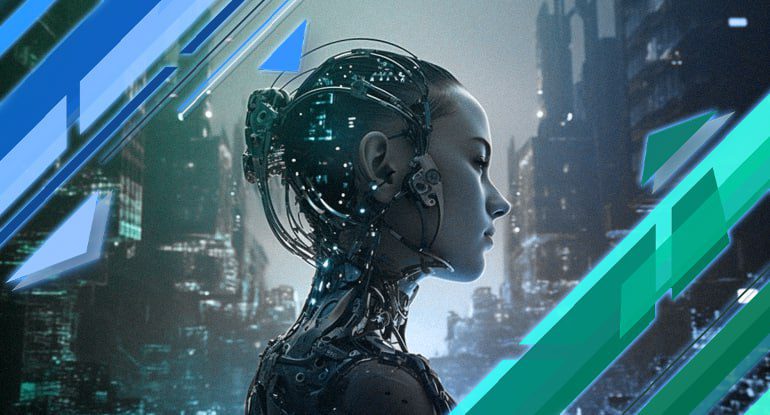Top 20 ChatGPT Prompts To Write Better Articles For Blockchain

Blockchain technology has become a transformative force across various industries, from finance and supply chain management to healthcare and beyond. Writing articles about blockchain requires in-depth knowledge, clarity, and the ability to explain complex concepts in a straightforward manner. ChatGPT, an AI language model, can assist in generating high-quality content. In this article, we present the top 20 ChatGPT prompts to help you write better articles on blockchain.
Top 20 ChatGPT prompts to help you write better articles on the blockchain

1. Blockchain Fundamentals
- Explain the foundational concepts of blockchain technology, including decentralized ledgers, cryptographic hashing, and consensus mechanisms.
2. Cryptocurrencies Explained
- Provide an overview of popular cryptocurrencies like Bitcoin and Ethereum. Discuss their uses, technologies, and market trends.
3. Smart Contracts and Their Applications
- Explore what smart contracts are and their real-world applications, from automated legal agreements to supply chain optimization.
4. Decentralized Finance (DeFi)
- Write about the rise of DeFi platforms, how they work, and the potential for transforming traditional financial services.
5. Blockchain Use Cases Beyond Finance
- Discuss blockchain applications in healthcare, voting systems, real estate, and more, highlighting their impact and challenges.
6. Privacy and Security in Blockchain
- Examine the privacy and security features of blockchain technology, including public vs. private blockchains and the role of cryptographic techniques.
7. The Blockchain Trilemma
- Explore the trade-offs between decentralization, security, and scalability, known as the blockchain trilemma, and how various projects address it.
8. Consensus Mechanisms
- Explain different consensus algorithms like Proof of Work (PoW), Proof of Stake (PoS), and Delegated Proof of Stake (DPoS), and their strengths and weaknesses.
9. Tokenomics and Economic Models
- Describe the economic models of blockchain networks, token creation, distribution, and their role in network governance.
10. Interoperability in Blockchain
- Discuss the challenges and solutions for achieving interoperability among diverse blockchain networks, enabling seamless data exchange.
11. Blockchain Development
- Provide insights into blockchain development tools, languages, and frameworks, guiding readers on how to get started.
12. Challenges in Blockchain Adoption
- Analyze the barriers and challenges that blockchain technology faces in gaining widespread adoption, including regulatory hurdles and scalability issues.
13. Blockchain and Environmental Impact
- Investigate the environmental concerns related to energy-intensive PoW blockchains and explore eco-friendly alternatives like PoS.
14. Initial Coin Offerings (ICOs) vs. Security Token Offerings (STOs)
- Compare and contrast ICOs and STOs, their regulatory frameworks, and implications for investors and project creators.
15. Central Bank Digital Currencies (CBDCs)
- Discuss the concept of CBDCs, the role of central banks in issuing digital currencies, and their potential impact on the financial sector.
16. Non-Fungible Tokens (NFTs) in Art and Entertainment
- Explore the NFT craze, focusing on their use in the art, music, and gaming industries, as well as the challenges and criticisms they face.
17. The Role of Oracles in Smart Contracts
- Explain the importance of oracles in providing external data to smart contracts and preventing single points of failure.
18. Blockchain in Supply Chain Management
- Discuss how blockchain enhances transparency and traceability in supply chains, reducing fraud and inefficiencies.
19. Future Trends in Blockchain
- Offer insights into emerging trends like cross-chain integration, quantum-resistant cryptography, and the growing importance of data privacy.
20. Blockchain and Social Impact
- Investigate how blockchain technology is being leveraged for social good, such as supporting refugees, addressing identity issues, and ensuring fair elections.
These 20 ChatGPT prompts cover a wide range of topics related to blockchain technology. Utilizing them as a starting point can help you craft well-informed, engaging, and informative articles that cater to both beginners and experts in the field of blockchain. The versatility of ChatGPT can provide valuable content for a variety of audiences, and its assistance can make the process of writing about blockchain more efficient and effective.
Also, read – Top 10 Ways ChatGPT Is Changing Blockchain
Top 10 things you should consider before writing prompts for Blochain articles

Before crafting prompts for blockchain articles, it’s crucial to consider several key factors to ensure the quality and relevance of your content. Here are the top 10 things to think about:
- Target Audience:
- Identify your target audience. Are you writing for beginners, industry professionals, or a specific niche within the blockchain space? Your prompts should align with the knowledge level and interests of your readers.
- Specific Topics:
- Determine the specific topics you want to cover. Blockchain is a broad field encompassing various subtopics like cryptocurrencies, smart contracts, DeFi, NFTs, and more. Your prompts should be tailored to the subjects you intend to explore.
- Current Trends:
- Stay updated on the latest trends and developments in the blockchain industry. Incorporate these trends into your prompts to make your articles timely and relevant.
- Research:
- Conduct thorough research on the topics you plan to address. This research will help you formulate informed prompts and provide valuable insights in your articles.
- Clarity and Simplicity:
- Ensure that your prompts are clear and concise. Blockchain can be a complex subject, so simplicity and clarity are essential to help readers understand the concepts.
- Engagement:
- Craft prompts that engage your readers. Pose questions or challenges that encourage critical thinking and spark interest in the topic.
- Balance:
- Balance your prompts across different aspects of blockchain, including technology, economics, regulation, and real-world applications. This variety ensures that your articles cover a broad spectrum of information.
- Practicality:
- Consider the practicality of your prompts. Can the questions lead to actionable insights, valuable advice, or relevant discussions? Avoid vague or overly theoretical prompts that may not resonate with readers.
- Diversity:
- Diversify your prompts to encompass both the positives and negatives of blockchain technology. Explore the benefits, challenges, and controversies surrounding blockchain to provide a well-rounded view.
- Long-Term Relevance:
- Think about the long-term relevance of your prompts. Are the topics you’re addressing likely to remain pertinent in the blockchain space? Avoid writing prompts solely based on short-lived trends.
By taking these considerations into account, you can create prompts that not only generate valuable and informative blockchain articles but also resonate with your target audience and provide insights that stand the test of time.
Is it better to use ChatGPT for your next blockchain content?

Using ChatGPT for your next blockchain content can be a valuable tool, but whether it’s “better” depends on your specific needs and goals. Here are some considerations to help you decide:
Pros of Using ChatGPT for Blockchain Content:
- Efficiency: ChatGPT can assist you in generating content more quickly, saving you time and effort in research and writing.
- Knowledge Assistance: ChatGPT has access to a vast amount of information and can provide insights, explanations, and answers to complex blockchain topics.
- Versatility: You can use ChatGPT to create a wide range of content, including articles, blog posts, social media content, and more.
- Consistency: ChatGPT can help maintain a consistent tone and style throughout your content, which is essential for branding and reader engagement.
- Idea Generation: It can assist in brainstorming and generating new ideas for blockchain content, helping you avoid writer’s block.
Cons of Using ChatGPT for Blockchain Content:
- Lack of Personal Expertise: ChatGPT provides information based on pre-existing knowledge, which may not always be up-to-date or specific to your unique insights or experiences.
- Editing Required: Generated content may require editing and fact-checking to ensure accuracy and relevance.
- Quality Control: While ChatGPT can be a helpful tool, the quality of the content ultimately depends on the quality of the input prompts and the fine-tuning of the generated content.
- Originality: If not used thoughtfully, ChatGPT content may lack originality and may resemble content generated for other users.
- Risk of Misinformation: If prompts are not carefully constructed, there’s a risk of inaccurate or misleading information being generated.
In conclusion, using ChatGPT for your blockchain content can be beneficial, especially for research, idea generation, and initial drafts. However, it should be used as a tool alongside your own expertise and careful editing to ensure the quality, accuracy, and originality of the content. The decision ultimately depends on your specific needs, your level of expertise in the blockchain field, and how you intend to use the content generated by ChatGPT.




























































